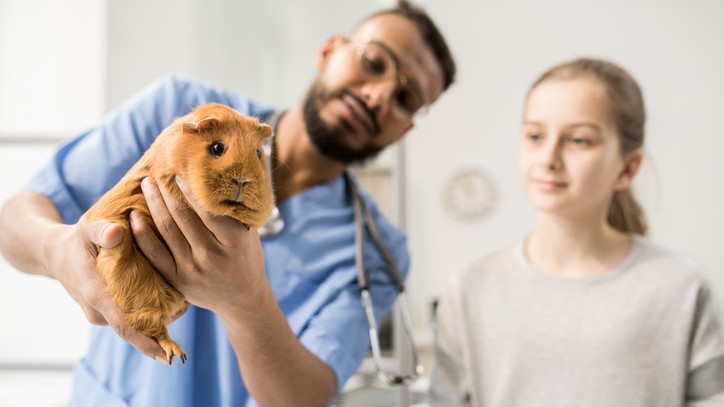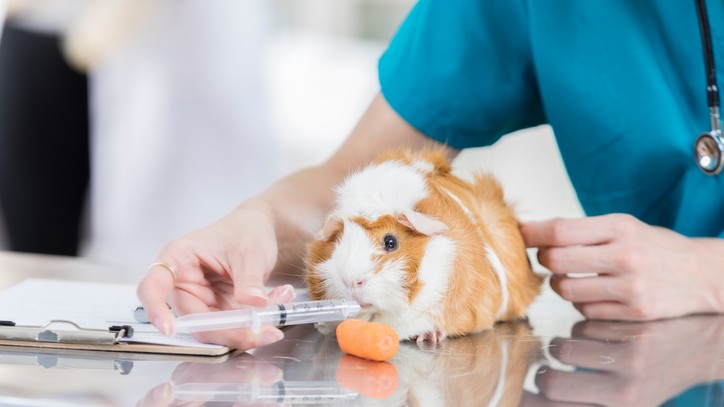What to do when your guinea pig is sick: Five common illnesses explained
Recognizing your guinea pig is sick: the five most common illnesses explained and what to do about them

It can be both upsetting and worrying when your guinea pig is sick. One minute they’re fine, playing with the best guinea pig accessories, the next they’re under the weather and it can be really hard to work out what’s wrong. Here we explain some of the most common guinea pig illnesses that vets come across, what to look out for, how to help prevent them and when to seek veterinary help.
- 10 things to know before you adopt a guinea pig
- Do guinea pigs sleep? Five tips from a vet for keeping your guinea pig healthy
- How long do guinea pigs live? Your top six guinea pig questions answered
How to tell if your guinea pig is sick
Guinea pigs are prey animals and because of this they’re incredibly good at hiding the fact that they’re not feeling very well; often not giving much warning before needing urgent veterinary help. There are a few signs that you can look out for that might indicate your guinea pig is sick:
- Change in activity level (quiet/huddled up)
- Weight change – unexpected loss or gain
- Changes in coat or hair quality, or loss
- Reduced or absent appetite
- Change in poo – smaller amounts or none, different appearance or diarrhoea
- Straining to pass urine or passing sludgy urine
1. Ileus or gut stasis: When normal movement of the guts stops
Ileus, or gut stasis, is when the normal movement or ‘peristalsis’ of the guts stops, it can be life-threatening and requires urgent veterinary attention. There are many different causes such as:
- Inappropriate diet
- Stress
- Trapped gas/bloat
- Dental disease
- Gut blockages: tumours, hairballs, eating foreign material such or bedding or cardboard
Watch for subtle signs such as refusing food and producing less or no poo. If you notice these symptoms you need to contact your vets as a matter of urgency as stasis can become fatal quickly.
They are likely to advise an examination and treatment may include hospitalisation, pain relief, fluids, and medications to encourage the guts to start moving again. With swift and aggressive early treatment, the outcome can be a good one – but some severe or advanced cases don’t respond to treatment and can result in death or require euthanasia.
Make sure your guinea pig has lots of good quality hay and fresh water, introduce any new foods slowly, and keep their environment stable (including temperature, noise and stress levels). Always act quickly if you see any changes in habits or behaviour that concern you.
2. Scurvy : Vitamin C Deficiency in Guinea Pigs
Vitamin C deficiency is caused when levels of this important vitamin are not adequate in the diet; this is because – unlike most animals – guinea pigs cannot make their own vitamin C, which is important for growth and repair of tissues within the body.
Get the best advice, tips and top tech for your beloved Pets
Signs of scurvy in guinea pigs can include bleeding gums, painful lameness, weakness, coat changes, and weight loss. Treatment may be aggressive and costly and include hospitalisation and medications.
Illness can be avoided by feeding appropriate diets which include commercial guinea pig pellets (these are supplemented with vitamin C) and varied fruits and vegetables. It is important to store your guinea pig food correctly and replace it regularly (ideally monthly) as vitamin content drops after production and even faster once opened. You should aim to buy smaller bags regularly rather than one that will last months.
3. Respiratory infections orpneumonia: Breathing issues in guinea pigs
Respiratory infections are fairly common in guinea pigs. Most are caused by bacteria which are commonly found in normal, healthy guinea pigs. These bacteria are ‘opportunistic’ and take advantage if your guinea is sick for any other reason, such as due to scurvy or because overcrowding, pregnancy, or poor environment are causing stress. Young guinea pigs and old guinea pigs are also more at risk. Making sure housing is dry, clean, and not too dusty can reduce the risk of pneumonia in guinea pigs.
The signs of pneumonia in guinea pigs include discharge from the eyes or nostrils, reduced appetite, trouble breathing, sneezing, and acting quieter than normal. If you see these signs, you should urgently seek treatment at your vets where they may take samples of the discharge from the eyes or nose and/or take chest x-rays. Medications to treat the condition will be prescribed and in some severe cases hospitalisation may be needed for oxygen therapy. In cases where pneumonia develops, treatment may not always be successful.

4) Ovarian cysts and uterine tumours in female guinea pigs
Ovarian cysts form within the ovaries of female guinea pigs and cause increased levels of hormones. These are very common in unneutered female guinea pigs, with one study finding them present in over 75% of female guinea pigs between the age of 1.5 and 5 years.
Signs include changes in behaviour (such as aggression), hair loss, vocalisation when being picked up (due to discomfort) and a swollen abdomen. Cysts also cause loss of fertility and increase the risk of uterine (womb) cancers.
If you think your guinea pig may have an ovarian cyst, you should visit your vet. They will conduct an examination and may suggest an ultrasound scan. Recommended treatment is usually a spay surgery to remove the ovaries.
5. Urinary tract disease: Urinary calculi are stones that form within the urinary system
Guinea pigs are also prone to urinary stones or ‘calculi’ – a serious condition. Most frequently these are found in the bladder but can also form in the kidneys. These stones can become lodged and cause blockages, which can be life-threatening.
Signs of urinary issues include weight loss, reduced appetite, straining or blood in the urine, swollen abdomen and reduced activity.
If you suspect any of these you must call your vet as a matter of urgency. Diagnosis may include blood and urine tests, and imaging such as x-rays. Treatment may require hospitalization and surgery to remove the stones.
Access to fresh water and appropriate diet that is not too high in calcium can help. Exercise is important as this increases water intake and frequency of urination which helps to reduce build-up of ‘sludge’ or crystals within the bladder. Recently, experts have been considering the role of stress in guinea pig urinary problems – giving your pig some hidey-holes and extra tunnels so they can exercise (and urinate!) unseen may help.
What to do if you suspect your guinea pig is sick
If you notice any change in your guinea pig’s activity levels, appetite or toileting habits contact your vet immediately, as waiting until the next day may be too late. Guinea pigs will hide the signs of illness for a long time, meaning that by the time they let you know there’s a problem it’s usually an emergency.
An appropriate and good-quality diet, environment (including bedding, housing, and entertainment), companionship, and room for exercise go a long way towards helping to reduce the chance of issues in your guinea pig. Regular (at least once a year) health checks at the vets can also help you to detect problems earlier for the best chance of a good outcome.
After graduating as a vet from the University of Nottingham in 2016, Dr. Joanna Woodnutt went on to practice companion animal medicine in the Midlands. She quickly developed a love of consulting and helping clients with medical problems such as dermatology, behavior and nutrition - anything that involved helping clients understand their pets better.
Jo started writing about pet health in 2017, realizing that it meant she could help even more pet parents. Since then, she has written for countless online and print publications and is a regular contributor for Edition Dog Magazine. Jo is the director of The Veterinary Content Company, which she founded in 2020. She is also the founder of Petlearnia, a platform that provides pet e-learning courses for pet parents.
Jo now lives in the Channel Islands with her husband Ian and terrier Pixie.

